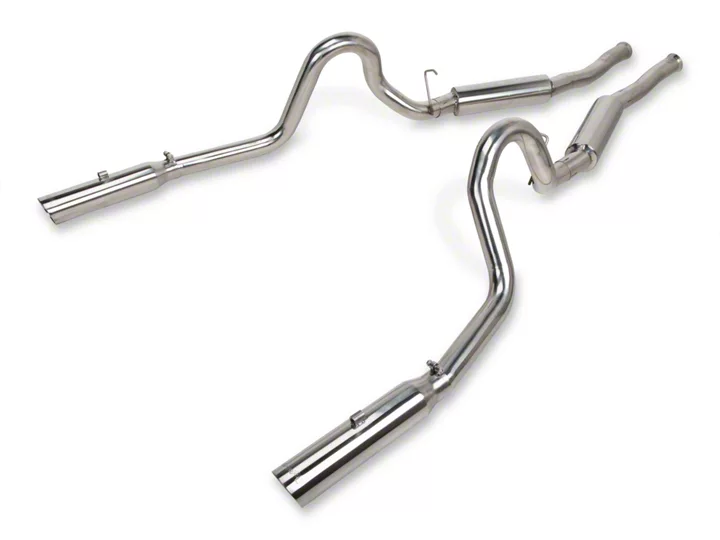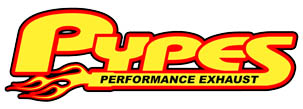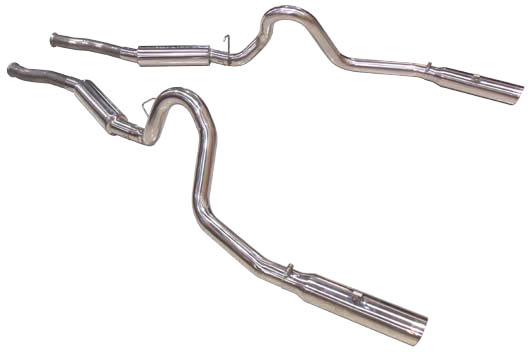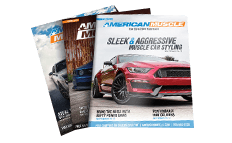
How to Install Pypes Pype-Bomb Catback Exhaust on your 1986-2004 Mustang GT, LX, Mach 1, and Bullit
Installation Time
2 hours
Tools Required
- Jackstands
- 9/16" Wrench
- Deep Socket with Ratchet
- Sawzall

Shop Parts in this Guide

Pypes Performance Exhaust
2705 Clemens Road Suite B103 Hatfield, PA 19440
800-421-3890 (voice) 267-638-3507 (fax)
www.pypesexhaust.com
SFM29V
Pype Bomb Cat-Back System
FITS: 1979-93 LX & 1994-97 GT & 1999-04 GT
Thanks again for purchasing your new stainless steel Pypes Performance
Exhaust Ford Mustang cat–back system. Please be sure to confirm all the
components in the kit were received in your shipment before beginning
installation. If you find any component missing, please contact our office at
800-421-3890 for replacements before you begin your installation. Installation
of this kit will require a few simple tools; jack stands9/16” wrench, deep
socket w/ ratchet and a saws-all. For a quicker and tighter installation, air
tools are recommended. Technical assistance is available both online at:
www.pypesexhaust.com or (800) 421-3890.
KIT INCLUDES:
( A ) 2 - EVT51D- Resonated Tips with hangers
( B ) 1 pair - TFM16- Tailpipes
( C ) 2 - MVR204S- M-80 Mufflers
( D ) 1 - PFF10K- Flowtube Kit
1 - HVC123- Hardware Kit

PLEASE TRY TO INSTALL OUR WAY FIRST!
1. Begin by placing the vehicle on a lift or four jack stands at maximum height. Make sure the rear housing is at full extended travel. Note: Removal of the rear tires will also allow the tailpipes to go over the rear axle much easier.
2. Unbolt the factory cat-back from the rear of your H-pipe or X-pipe. Next, remove the four clamps at the mufflers. If you still have a factory system on the car, you will need to cut the mufflers out of the system using a hack saw or a saws-all. Finish by removing the tailpipes from the rubber hangers. Be sure to check the rubber hangers to see if they are in good shape. Old stretched out rubber hangers will make your new system hang and fit poorly. If new hangers are required, Pypes Performance Exhaust has new kits available for the 79-04 owners.
3. Now it’s time to install your new cat-back. Begin with the tailpipes first, slipping the tailpipe over the rear axle. Once the over-the-axle portion is in-place, slide the tips on to the tailpipes. Slide the wire form hangers through the rubber hanger closest to the rear of the car. Next, choose the correct tip hanger for your application and install them through the boss on the tip and slide the other end through the rear hanger at the bumper. Make sure to leave the clamping bolts and set screws loose until the entire kit is installed. A small amount of grease or liquid soap will allow the hanger to slide through easier.
4. Next install the mufflers on to the tailpipes. Again, a small amount of grease in the muffler inlet and outlet will allow for easy rotation when adjusting for the perfect fit.
5. Next, install the flow tube flanges on to the flow tubes and slide them into the inlets of each muffler. A small amount of grease will also help here too. The shorter flow tube belongs on the driver side of the vehicle. Once the flow tubes are in place, you can install the bolts to connect them to your H-pipe or X-pipe. NOTE: On some applications some trimming of the flow tubes may be needed to obtain optimal alignment of the system. If your vehicle still has a factory H-pipe, you will just reuse the factory bolts and nuts as the bolts are an integral part of the h-pipe. Snug the hardware just enough to allow rotation for adjustment. Now install the four clamps on the muffler necks, snug the nuts, and DON’T TIGHTEN. Once these clamps are tightened you will not be able to adjust any of the components.
6. Lastly, make all your final adjustments for fit. Make sure the mufflers are flat and parallel to the ground. Rotate the flow tubes for the best fit. Also, make sure the tailpipes are positioned in the correct location under or through the rear bumper. Once you are satisfied with the fit, tighten all four clamps, tip clamps and hanger set screws and the connections points of the H or X-pipe. Air tools will allow the tightest clamping possible. Now it’s time to fire up your Mustang. Remember to listen and check for exhaust leaks. Also, periodically check all connections points as they may come loose.
NOTE: Black residue at any of the connections indicates an exhaust leak.

